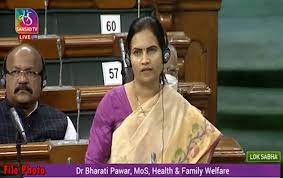As per information provided by National Medical Commission (NMC), there are 13,08,009 allopathic doctors registered with the State Medical Councils and the National Medical Commission (NMC) as of June, 2022. Assuming 80% availability of registered allopathic doctors and 5.65 lakh AYUSH doctors, the doctor-population ratio in the country is 1:834 which is better than the WHO standard of 1:1000. Also, there is 34.33 lakh registered nursing personnel and 13 lakh Allied and Healthcare Professionals in the country.
The Government has taken the following steps to further increase the availability of doctors in the country, particularly in underserved regions. The number of UG seats has increased from 51,348 before 2014 to 91,927 seats which is an increase of 79%. The number of PG seats has increased by 93% from 31,185 seats in 2014 to 60,202 seats. The steps to increase doctor-patient ratio include: –
- Centrally Sponsored Scheme for establishment of the new medical college by upgrading district/ referral hospital under which 157 new medical colleges have been approved and 72 are already functional.
- Centrally Sponsored Scheme for strengthening/ up-gradation of existing State Government/Central Government Medical Colleges to increase MBBS and PG seats.
- Central Sector Scheme for up-gradation of Government Medical Colleges by the construction of Super Specialty Blocks. A total of 75 projects have been approved and 55 have been completed.
- Under the Central Sector Scheme for setting up of new AIIMS, 22 AIIMS have been approved. Undergraduate courses have started in 19 AIIMS.
- Relaxation in the norms for setting up of Medical College in terms of the requirement for faculty, staff, bed strength and other infrastructure.
- DNB qualification has been recognized for appointment as faculty to take care of the shortage of faculty.
- Enhancement of age limit for appointment/ extension/ re-employment against posts of teachers/dean/principal/ director in medical colleges up to 70 years.
- The tenure of Senior Residency for appointment of Assistant Professor has been reduced from three years to one year.
- Under the District Residency Programme (DRP), all the doctors admitted to PG courses from 2022 onwards, to serve in the district hospitals for three months mandatorily.
Further, with a view to augmenting the availability of qualified manpower in the field of mental health, the Government, under the National Mental Health Programme (NMHP), implements manpower development schemes for the establishment of Centres of Excellence and strengthening/ establishment of Post Graduate (PG) Departments in mental health specialties. Support has been provided for the establishment of 25 Centres of Excellence and the strengthening/ establishment of 47 Post Graduate (PG) Departments in mental health specialties in the country.
The Government also augments the availability of manpower to deliver mental healthcare services in the underserved areas of the country by providing online training courses to various categories of general healthcare medical and para-medical professionals through the Digital Academies established at the three Central Mental Health Institutes namely the National Institute of Mental Health and Neuro Sciences, Bengaluru, Lokopriya Gopinath Bordoloi Regional Institute of Mental Health, Tezpur, Assam, and Central Institute of Psychiatry, Ranchi.
Besides the above, the Government has announced a “National Tele Mental Health Programme” in the Budget of 2022-23, to further improve access to quality mental health counseling and care services in the country.
The Union Minister of State for Health and Family Welfare, Dr. Bharati Pravin Pawar stated this in a written reply in the Rajya Sabha today.












